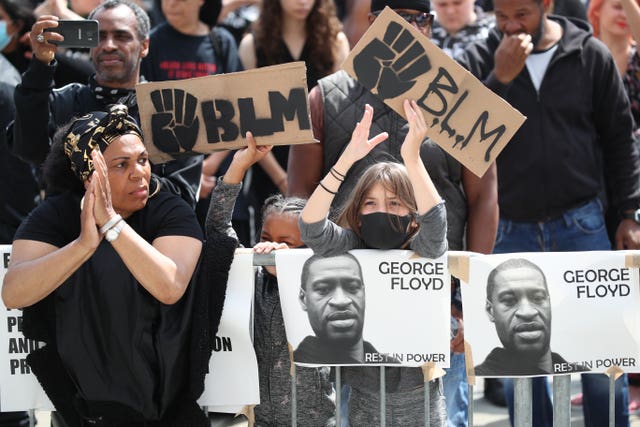
James O'Brien 10am - 1pm
25 June 2021, 20:44

Terrence Floyd, one of Mr Floyd’s brothers, addressed the sentencing hearing.
George Floyd’s family have spoken in court of the pain they felt over his murder and asked for the maximum punishment for former police officer Derek Chauvin.
“On behalf of me and my family, we seek the maximum penalty. We don’t want to see no more slaps on the wrist. We’ve been through that already,” said a tearful Terrence Floyd, one of Mr Floyd’s brothers.
Chauvin, 45, faces a potential decades-long sentence, with some legal experts predicting 20 to 25 years.

In brief remarks before sentencing, Chauvin offered condolences to Mr Floyd’s family, saying he hopes they eventually get “some peace of mind”.
Earlier, Mr Floyd’s seven-year-old daughter said she wishes she could tell her late father that “I miss you and I love you”.
Gianna Floyd’s video interview was played in court on Friday during the sentencing hearing of former Minneapolis officer Chauvin.
Gianna said in the victim impact statement that she believed her father was still with her in spirit and that she wants to know how he got hurt.
“We used to have dinner meals every single night before we went to bed,” she said. “My daddy always used to help me brush my teeth.”
She had a long list of things she would still have liked to do with her father. “I want to play with him, have fun, go on a plane ride,” she said.

Prosecutor Matthew Frank asked the judge to exceed sentencing guidelines and give Chauvin 30 years in prison, saying “tortured is the right word” for what the officer did to Floyd.
“This is not a momentary gunshot, punch to the face. This is nine-and-a-half minutes of cruelty to a man who was helpless and just begging for his life,” Mr Frank said.
Chauvin’s mother Carolyn Pawlenty took the stand to plead for mercy for son, saying his reputation has been unfairly reduced to that of “an aggressive, heartless and uncaring person” and a racist.
“I can tell you that is far from the truth,” she told the judge. “I want this court to know that none of these things are true and that my son is a good man.”
She added: “Derek, I want you to know I have always believed in your innocence, and I will never waver from that.”
“I will be here for you when you come home,” she said.
Chauvin was convicted of second-degree unintentional murder, third-degree murder and second-degree manslaughter for pressing his knee against Floyd’s neck for about nine-and-a-half minutes as the black man said he could not breathe and went limp.
Bystander video of Floyd’s arrest for suspicion of passing a counterfeit 20 US dollar bill prompted protests around the world and a nationwide reckoning on race and police brutality.
Under Minnesota statutes, Chauvin will be sentenced only on the most serious charge, which has a maximum sentence of 40 years. But case law dictates that a 30-year sentence would be the practical maximum sentence Judge Peter Cahill could impose without risk of being overturned on appeal.
Prosecutors asked for 30 years, saying Chauvin’s actions were egregious and “shocked the nation’s conscience.”
Defence attorney Eric Nelson requested probation, saying Chauvin was the product of a “broken” system and “believed he was doing his job”.

Judge Cahill has already found that aggravating factors in Floyd’s death warrant going higher than the 12-and-a-half year sentence recommended by the state’s sentencing guidelines.
The judge found Chauvin abused his position of authority, treated Floyd with particular cruelty, and that the crime was seen by several children. He also wrote that Chauvin knew the restraint of Floyd was dangerous.
“The prolonged use of this technique was particularly egregious in that George Floyd made it clear he was unable to breathe and expressed the view that he was dying as a result of the officers’ restraint,” Judge Cahill wrote last month.
Chauvin can also make a statement, but it is not clear if he will. Experts say it could be tricky for Chauvin to talk without implicating himself in the pending federal case accusing him of violating Floyd’s civil rights.
Chauvin chose not to testify at his trial. The only explanation the public has heard from him came from body-camera footage in which he told a bystander at the scene: “We got to control this guy ’cause he’s a sizable guy … and it looks like he’s probably on something.”

Several experts said they doubted Chauvin would take the risk and speak, but Brandt thought he would. He said Chauvin could say a few words without getting himself into legal trouble.
“I think it’s his chance to tell the world, ‘I didn’t intend to kill him,'” Brandt said. “If I was him, I think I would want to try and let people know that I’m not a monster.”
No matter what sentence Chauvin gets, he’s likely to serve only about two-thirds behind bars presuming good behaviour. The rest would be on supervised release.
He has been held since his conviction at the state’s only maximum security prison, in Oak Park Heights.
The former officer is held away from the general population for his safety, in a 10-by-10-foot cell, with meals brought to his room. He is allowed out for solitary exercise for an hour a day.
It is not clear if Chauvin will remain there. State prisons officials said that decision would not be made until after Cahill’s formal sentencing order.
Chauvin and the three other officers involved in Floyd’s arrest are awaiting trial in federal court on charges of violating Floyd’s civil rights. No trial date has been set.
The three other officers are also scheduled for trial in March on state charges of aiding and abetting both murder and manslaughter.